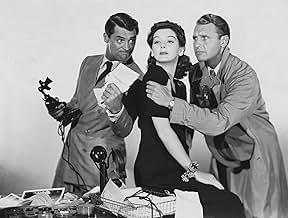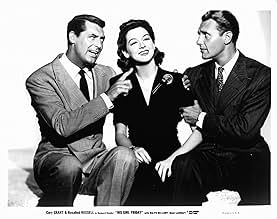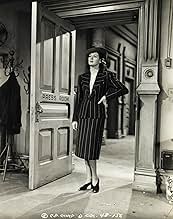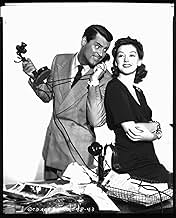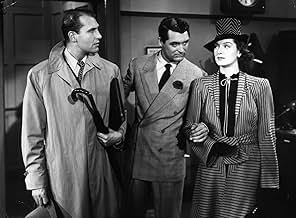Quando l'abile reporter Hildy Johnson annuncia di voler lasciare il mondo del giornalismo per dedicarsi completamente alla vita domestica, il suo editore, nonchè ex-marito, ricorre ad ogni m... Leggi tuttoQuando l'abile reporter Hildy Johnson annuncia di voler lasciare il mondo del giornalismo per dedicarsi completamente alla vita domestica, il suo editore, nonchè ex-marito, ricorre ad ogni mezzo per convincerla del contrario e per conquistare di nuovo il suo cuore.Quando l'abile reporter Hildy Johnson annuncia di voler lasciare il mondo del giornalismo per dedicarsi completamente alla vita domestica, il suo editore, nonchè ex-marito, ricorre ad ogni mezzo per convincerla del contrario e per conquistare di nuovo il suo cuore.
- Regia
- Sceneggiatura
- Star
- Premi
- 5 vittorie e 1 candidatura in totale
Recensioni in evidenza
Cary Grant is excellent at this kind of manic comedy, and Rosalind Russell gives what had to be one of her very best performances, as a worthy foil for Grant's domineering character. Ralph Bellamy is also ideal as the naive insurance salesman, and they are backed up by a cast filled with fine comic character actors. Some of the supporting cast do a terrific job of getting laughs with very limited screen time. They all get great material to work with, too. The dialogue is just amazing, with funny, creative lines coming constantly - sometimes literally on top of each other. The setting and the plot create hilarious situations and some great opportunities to satirize politicians and the news media. If anything, the satire is even funnier and more appropriate as regards today's institutions than it was in 1940.
"His Girl Friday" is absolutely hilarious, a classic comedy that you can watch and enjoy over and over.
making it possible for me to watch it in such pristine condition! (I've got the 2002 edition, and from what I've heard you should beware of earlier DVD issues).
Walter Burns, the conniving, self-serving newspaper editor, is a character that could have easily come off as a tyrannical jerk. As portrayed by the suave Cary Grant, however, the pompous, arrogant Burns actually becomes (gasp!) likable! It is a difficult balancing act that Grant must perform as teetering between the two extremes of the character, and he is arguably the only actor imaginable with the skill and charisma to pull such a tricky characterization off this successfully. And the one-and-only Rosalind Russell is every bit his match - full of verve and aplomb, Russell's Hildy is an independent career woman, brimming with intelligence and class, that impressively pre-dates the major feminist movement of the mid-sixties by a good 25 years.
The film's supporting cast is no less impressive, with every single role cast to perfection. This is particularly true of Ralph Bellamy, who (along with his Oscar-nominated performance in 1937's THE AWFUL TRUTH) proves once again that he is the ultimate straight man. The film contains some grim subject matter that may seem like unlikely fodder for a screwball comedy (murder, attempted suicide, and public execution are all touched upon), although the film somehow manages to deal with such topics respectfully and without sacrificing any laughs. In the end, HIS GIRL Friday is an absolutely unbeatable romantic comedy that remains wildly hilarious and comes as close to sheer perfection as any motion picture could ever hope to.
The crossfire dialogue is occasionally relieved by stretches of tedium. Rosalind Russell is charming and bright, and Ralph Bellamy does the best he can with what he's given. While there may be occasional touches of wit and good characterizations from the actors, His Girl Friday is one of the most irritating of Howard Hawks' films.
The best thing about the film IS the dialogue. Characters speak at a break-neck speed, throwing witticisms left and right as if they were candy. Many times, while one is laughing at one joke, they would miss another right after it. That is how quickly the jokes are thrown out in the film. Cary Grant and Rosalind Russell are great at spilling lines out seemingly without any problem. It's a real testament to how professional these two were (along with the rest of the cast) with the amount of verbal meat they had to chew; I can't think of an actor today that could possibly pull of the kind of dialogue that was given in this film.
The problem that I had with the film was that the dialogue was the ONLY great thing about it. Unfortunately, the characters and situations presented in the film had little sympathy and lack of any kind of real depth. The situation with the falsely accused murderer was handled poorly given the context of his predicament; instead of really caring about this person and really trying to help him become cleared of charges, the Grant and Rosalind characters instead used him for their own purposes in getting "the big scoop." Now, of course one can argue that that WAS the reason they treated him the way they did, my issue is that such a serious subject was handled in a supposed "comedic" fashion; as if it was OK that this falsely accused person can be treated in such a horrible way, simply because it handled comedically. The last-second deus ex machina that sealed this person's fate supports the idea that his story wasn't really handled with any kind of importance.
The thing the really hurt the film was the love triangle between the Grant and Rosalind characters, and the Rosalind's character's fiancé. We are told in the beginning of the film that Grant and Rosalind are divorcees, and Rosalind is set to marry her fiancé the very next day in Albany. Of course, in a film like this, we are supposed to root for the Grant and Rosalind characters to get together at the end. the problem is, the Grant character is such a manipulative creep that at the end of the film I found myself actually rooting for the fiancé to the win the girl. Three times in the movie, the Grant character manipulates the situation, causing the fiancé to be thrown in jail, and preventing the would-be married couple from leaving the city. This in turn gives the Grant character enough time to convince Rosalind that she will always be "a newspaperman." The Rosalind character isn't much better either. Throughout the beginning of the film, she keeps explaining to others that she is through with the newspaper business, that she wants to settle down, raise a family, and not have to deal with the daily grind of hunting down a story. Well, does settling down and having a family sound like a bad thing to you? I didn't think so. Every time she tries to leave, she gets bogged down and distracted by the story (many times through the very fault of the Grant character). It gets so bad, that when the fiancé comes to her, begging her to leave with him, she brushes him off like a fly, barely acknowledging him. Even worse, when the fiancé's mother comes into play, the Rosalind character actually ALLOWS Grant to have her kidnapped and taken away! "His Girl Friday" would've worked if the filmmakers had cared enough about the characters than they did about the dialogue. The actor playing the fiancé did a thankless job; without much to work with, he actually created a character we cared about more so than the two leads. Sure he was a little simple, but that's a lot more than can be said about the other two. At the end of the film, I thought to myself "these two characters were divorced before the film started. Based on all the manipulative actions these two had throughout the story, is there any evidence that they'll stay together once the movie is over?" Maybe they deserve each other, because they certainly don't deserve anyone else.
Lo sapevi?
- QuizIt is estimated that the normal rate of verbal dialogue in most films is around 90 words a minute. In La signora del venerdì (1940), the delivery has been clocked at 240 words a minute.
- BlooperWhen Bruce Baldwin comes to the press room late in the movie, an electric fan and small shelf on the wall to the left of the door both completely disappear. Both have been there in all previous scenes and both reappear after this scene.
- Citazioni
[describing Bruce]
Walter Burns: He looks like that fellow in the movies - Ralph Bellamy.
- Curiosità sui creditiOpening credits prologue: It all happened in the "Dark Ages" of the newspaper game--when to a reporter "Getting that story" justified anything short of murder.
Incidentally you will see in this picture no resemblance to the man and woman of the press today.
Ready?
Well, once upon a time - -
- ConnessioniEdited into Michael Jackson's This Is It (2009)
I più visti
Dettagli
- Data di uscita
- Paese di origine
- Lingue
- Celebre anche come
- Ayuno de amor
- Luoghi delle riprese
- Azienda produttrice
- Vedi altri crediti dell’azienda su IMDbPro
Botteghino
- Lordo in tutto il mondo
- 330 USD
- Tempo di esecuzione1 ora 32 minuti
- Colore
- Proporzioni
- 1.37 : 1
Contribuisci a questa pagina




